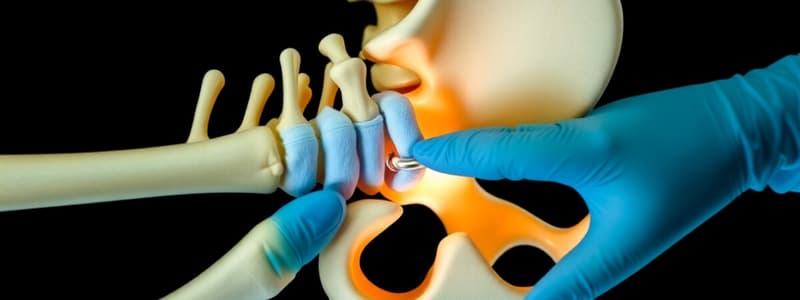Podcast
Questions and Answers
What is the primary function of ligaments in the skeletal system?
What is the primary function of ligaments in the skeletal system?
- To facilitate muscle movement around joints.
- To protect against joint instability.
- To connect bone to bone and provide joint stability. (correct)
- To transmit forces to bone or cartilage.
Which type of bone tissue is found at the ends of long bones and contains red bone marrow?
Which type of bone tissue is found at the ends of long bones and contains red bone marrow?
- Compact bone
- Trabecular bone
- Cancellous bone (correct)
- Cortical bone
Where is the periosteal layer located and what is its significance during bone repair?
Where is the periosteal layer located and what is its significance during bone repair?
- It covers all joints and stabilizes them during movement.
- It covers all bones and must be stripped away during fracture repair. (correct)
- It is a dense layer found only in long bones, preventing fracture.
- It covers the entire skeletal system and provides immunity.
What is the order of instruments used for fixing a bone fracture?
What is the order of instruments used for fixing a bone fracture?
What distinguishes autografts from allografts in orthopedic procedures?
What distinguishes autografts from allografts in orthopedic procedures?
Which tool is specifically used for measuring the depth of a drilled hole in bone?
Which tool is specifically used for measuring the depth of a drilled hole in bone?
What is the function of the synovial membrane in the context of joints?
What is the function of the synovial membrane in the context of joints?
How does cancellous bone contribute to the process of healing after a bone graft?
How does cancellous bone contribute to the process of healing after a bone graft?
What is the primary purpose of using ortho hardware with bone grafts?
What is the primary purpose of using ortho hardware with bone grafts?
Which instrument is specifically designed to grasp and remove the intervertebral disc?
Which instrument is specifically designed to grasp and remove the intervertebral disc?
What is the maximum recommended inflation pressure for a pneumatic tourniquet used on the arm?
What is the maximum recommended inflation pressure for a pneumatic tourniquet used on the arm?
What is the risk associated with powered surgical instruments if not properly managed?
What is the risk associated with powered surgical instruments if not properly managed?
What best practice should be followed regarding tourniquet inflation time in surgical procedures?
What best practice should be followed regarding tourniquet inflation time in surgical procedures?
Which of the following surgical procedures is least likely to utilize a pneumatic tourniquet?
Which of the following surgical procedures is least likely to utilize a pneumatic tourniquet?
What is a significant nursing consideration when using powered surgical instruments?
What is a significant nursing consideration when using powered surgical instruments?
How long can a pneumatic tourniquet be safely inflated on the lower extremity before potential risks arise?
How long can a pneumatic tourniquet be safely inflated on the lower extremity before potential risks arise?
Which of the following describes a common consequence of drill activation on sterile drapes during surgery?
Which of the following describes a common consequence of drill activation on sterile drapes during surgery?
In which situation should additional inflation time for a pneumatic tourniquet be requested?
In which situation should additional inflation time for a pneumatic tourniquet be requested?
Which virtue emphasizes the focus on the best interests of the patient in perioperative nursing?
Which virtue emphasizes the focus on the best interests of the patient in perioperative nursing?
What aspect does conscientiousness in nursing primarily address?
What aspect does conscientiousness in nursing primarily address?
Which CNO ethical value specifically deals with how a nurse should respect the individual dignity of patients?
Which CNO ethical value specifically deals with how a nurse should respect the individual dignity of patients?
When considering the goals and purpose of treatment, what is the role of the Perioperative Nursing Data System (PNDS)?
When considering the goals and purpose of treatment, what is the role of the Perioperative Nursing Data System (PNDS)?
Which of the following standards is NOT included in the Perioperative Nurse Practice Standards?
Which of the following standards is NOT included in the Perioperative Nurse Practice Standards?
What is one of the primary reasons for using PMMA in orthopedic surgery?
What is one of the primary reasons for using PMMA in orthopedic surgery?
What safety measure is essential when working with the liquid component of PMMA in the operating room?
What safety measure is essential when working with the liquid component of PMMA in the operating room?
How should prostheses be handled to avoid contamination during surgery?
How should prostheses be handled to avoid contamination during surgery?
In closed reduction of a fracture, what is primarily confirmed through radiography?
In closed reduction of a fracture, what is primarily confirmed through radiography?
What is the role of Bacitracin during orthopedic procedures?
What is the role of Bacitracin during orthopedic procedures?
What condition is primarily associated with causing osteomyelitis, an infectious process?
What condition is primarily associated with causing osteomyelitis, an infectious process?
What is a significant advantage of external fixation in orthopedic surgery?
What is a significant advantage of external fixation in orthopedic surgery?
Which of the following is NOT a goal of fracture surgery?
Which of the following is NOT a goal of fracture surgery?
What essential documentation must be completed for a prosthesis used in surgery?
What essential documentation must be completed for a prosthesis used in surgery?
What is the primary risk associated with an open fracture that differentiates it from a closed fracture?
What is the primary risk associated with an open fracture that differentiates it from a closed fracture?
What distinguishes a unipolar prosthetic from a bipolar prosthetic in hip replacement?
What distinguishes a unipolar prosthetic from a bipolar prosthetic in hip replacement?
What is the primary benefit of using intramedullary (IM) rods for fracture fixation?
What is the primary benefit of using intramedullary (IM) rods for fracture fixation?
Which ligaments are primarily involved in reinforcing the knee capsule?
Which ligaments are primarily involved in reinforcing the knee capsule?
During a bilateral total hip replacement using the modular method, what is the main purpose of this approach?
During a bilateral total hip replacement using the modular method, what is the main purpose of this approach?
What material is primarily used to irrigate the joint during an arthroscopy?
What material is primarily used to irrigate the joint during an arthroscopy?
Which statement is true regarding arthroscopic procedures compared to traditional surgery?
Which statement is true regarding arthroscopic procedures compared to traditional surgery?
What is a common system name used for intramedullary nail fixation in femur fractures?
What is a common system name used for intramedullary nail fixation in femur fractures?
What are the two primary articulations that make up the knee joint?
What are the two primary articulations that make up the knee joint?
What type of incision is associated with intramedullary fixation procedures?
What type of incision is associated with intramedullary fixation procedures?
Which of the following is NOT a characteristic of arthroscopy?
Which of the following is NOT a characteristic of arthroscopy?
Study Notes
Anatomy of Orthopedics
- Muscles provide movement to the skeletal system by covering bones.
- Ligaments connect bone to bone, ensuring joint stability.
- Tendons transmit forces from muscles to bones or cartilage at their endpoints.
- Cartilage, an elastic tissue, supports and stabilizes the ends of bones.
- Joints are formed by the articulations where bones meet.
Bone Tissue and Blood Supply
- Two types of bone tissue: cortical (hard outer shell) and cancellous (soft spongy tissue).
- Cancellous bone is found in areas like the iliac crest, tibia, and ends of long bones, housing red marrow.
- Long bones consist of a shaft (diaphysis) and two ends (epiphyses), separated by the epiphyseal plate until skeletal maturity.
- Periosteum is a connective tissue covering over bones, crucial for fracture repair.
- The synovial membrane covers articulating surfaces of joints.
Surgical Instruments Sequence for Bone Fixation
- Stabilize the fracture with a bone holder.
- Drill a hole in the bone for the screw.
- Tap the hole to create a stable canal for screw insertion.
- Use a depth gauge to measure screw length.
- Insert the screw with a screwdriver.
Minor Count in Orthopedic Surgery
- A minor count includes initial count, closing count, and final count for all orthopedic procedures.
Bone Grafts
- Bone grafts fill cavities from bone removal, promote union of fractures, and fill defects.
- Allografts are from tissue banks, while autografts use the patient’s bone, typically from the iliac crest.
- Cancellous bone from the iliac crest grows into the host bone.
- Cortical bone grafts require stabilization with orthopedic hardware.
Instrument Identification
- Kerrison Rongeur: used to grasp and resect the lamina of the bone.
- Pituitary Rongeur: used for grasping and removing intervertebral discs.
Equipment and Nursing Considerations
- Ensure powered surgical instruments (drills) are properly secured and tested before use to prevent accidental activation.
- C-Arm provides fluoroscopy during orthopedic surgeries; all OR personnel must wear protective lead gowns.
Pneumatic Tourniquets
- Used to create a bloodless surgical field in extremity procedures.
- Inflation pressure determined by patient’s blood pressure and extremity size (max 250-300 mmHg for arms, 300-350 mmHg for thighs).
- Cuff inflation limited to 60 minutes for upper extremities and 120 minutes for lower, with documentation of usage times.
Bone Cement (PMMA)
- Created by mixing powder with liquid to form a radiopaque cement.
- Liquid is flammable; proper ventilation is needed, and exposure should be minimized.
- PMMA mixed with antibiotics has been shown to reduce infection rates.
Handling Prosthesis
- Prosthesis must be handled carefully to prevent damage or contamination.
- Document implant details like serial number and expiration date.
- Sterilization must include a biological indicator for implants.
Fracture Surgery Overview
- Fractures result from trauma, infection, or conditions like osteoporosis.
- Surgery aims to align fractured bones and restore function.
- Techniques include closed reduction (non-surgical alignment confirmed by radiography), external fixation (rigid fixation for severe fractures), and IM rods/nails for internal fixation.
Arthroscopy Surgery
- Arthroscopies allow for visualization and treatment of joint issues using scopes.
- Common in knee, shoulder, and wrist surgeries; offers reduced recovery time and less pain.
- Normal saline is used for irrigation to maintain joint distention.
Focal Virtues in Nursing
- Compassion: prioritizing patient well-being.
- Discernment: applying insightful judgment in care.
- Trustworthiness: building strong relationships with patients.
- Integrity: maintaining dignity and respect.
- Conscientiousness: focusing on patient-centered care.
CNO Ethical Values
- Emphasis on client well-being, choice, privacy, respect for life, and truthfulness.
- Commitments to fairness and maintaining trust in healthcare practices.
Perioperative Nurse Practice Standards
- Utilize interdisciplinary knowledge for effective clinical decision-making.
- Ensure patient safety through collaboration and accountability in care delivery.
Studying That Suits You
Use AI to generate personalized quizzes and flashcards to suit your learning preferences.
Related Documents
Description
Test your knowledge on the skeletal system with this quiz focused on ligaments, bone tissue, and repair processes. Learn about critical concepts like the significance of the periosteal layer, the types of bone grafts, and instruments used for fracture fixing. Perfect for students and professionals in orthopedics.




